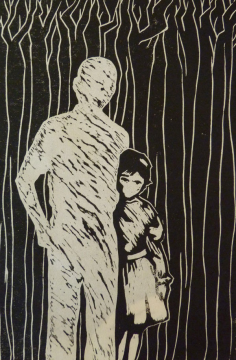Fiction Sandra Ketcham — May 22, 2012 13:12 — 0 Comments
Amelie – Sandra Ketcham
Amelie is tall and thin. In high school, the other girls called her “Amazon Amelie.†She was less thin then and less tall. She stopped eating when she turned 17, lost a lot of weight, and now waits in the hospital for a new kidney to replace the one she starved to death.
The night nurse, Josh, feels sorry for her. He thinks Amelie is beautiful, with her thin dark hair and her sharp, angular face, so he spends more time with her than with his other patients. Sometimes, when no one is watching, he sneaks candy bars into her room. He lays them neatly on the edge of her bed, hoping she will eat them after he leaves.
Dr. Waters, Amelie’s nephrologist, visits her almost every day. After listening to her beg for several weeks and consulting with her psychiatrist and other doctors, he tells Amelie that her body is well enough to wait at home for a new kidney. First, however, she must prove her psychological fitness and she’ll have to return for regular dialysis appointments and weight checks at the hospital.
When Darlene comes on duty in the morning, Amelie trades the candy bars for her friendship. Over time they form a lopsided bond. Darlene is in her 50s and thinks of Amelie like a daughter. Amelie needs Darlene to believe she is eating and is strong enough for release from the hospital. She needs Darlene to care enough about her to convince Dr. Waters that she should go home.
Amelie also need’s Josh’s testimony, which is why she puts on lipstick before his shift starts, pulls her gown up in bed to highlight her thin thighs, and tells him how much he means to her. Josh wants to believe her, so he does. He sees a fragile young woman when he looks at her; he sees someone to care for.
When the doctor comes to evaluate Amelie for discharge, he sees what he hopes to see. He tells her he is proud of her improvement and explains that her new attitude about eating and her age have pushed her to the top of the transplant list. He smiles and says she can wait at home for her new kidney, but only if she continues eating and takes her medication.
Thrilled by her accomplishment, Amelie barely sleeps for the next two days. On the morning of her discharge, she is 11 pounds heavier than when she arrived and 24 pounds heavier than she wants to be. As Darlene pushes her down the hall in a wheelchair on the way to check out, she passes an open room with a teenage girl sleeping inside.
“That is Melissa. She has lupus and is waiting on a new kidney, too,” explains Darlene. “Lucky for you, the doctor thinks you’re eating enough and doing well enough to get one before her. You just take good care of your new kidney and good care of yourself, and everything will be alright.”
Amelie feels guilty for a moment, almost like she is stealing Melissa’s kidney. Then she thinks how great it will be to feel well again, to be able to go where she wants, whenever she wants, to be able to exercise again. And she smiles, and she forgets all about Melissa.
The answer isn't poetry, but rather language
- Richard Kenney



